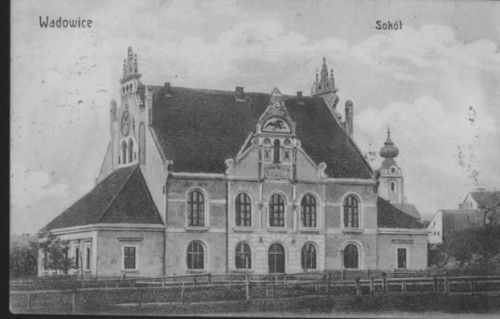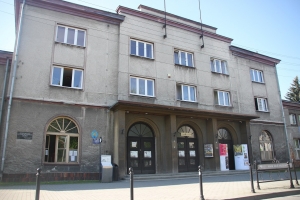In the higher grades of the middle school, Karol was absorbed by the theatre. He has grown up as a discussion partner for Mieczysław Kotlarczyk. At that time serious plays was staged, and the actors had huge ambitions. Karol also directed some of the plays, he contributed a lot, but he was still a very god student. He had always been an excellent student.
Szczepan Mogielnicki - a middle school colleague
The Polish Gymnastic Society “Sokół” (“Falcon”) was established in Wadowice in 1887. In addition to gymnastics, it was also involved in educational, cultural and artistic activities. A theatre company was formed very quickly as a part of “Falcon” Society in Wadowice. Two years later the building of the society was built, which had a large gymnasium with a stage. Thanks to this, it hosted the majority of the most important events, performances of foreign choirs, highlander music groups, piano concerts, as well as meetings with poets, playwrights and actors.
Karol Wojtyła had already come into contact with theatre as a young boy. First, as a spectator of the “Jagiellonka” theatre company's performances, in which his older brother Edmund played. As a middle school student, he became involved in the activities of the school theatre club together with students of the female middle school. Their first joint performance was an adaptation of “Sobótka” by J. Kochanowski. Shortly afterwards, Karol, fascinated by the theatre, went to Cracow to watch performances for young people organised by Juliusz Osterwa.
In 1934, the middle school students staged J. Słowacki's “Kordian” with Wojtyła in the leading role, supervised by Mieczysław Kotlarczyk. In the same year, Halina Królikiewicz, together with her father, the new director of the male middle school, came to Wadowice. She became involved in the activities of the inter-school theatre club very quickly. The next year, H. Królikiewicz and Wojtyła played together on the “Sokół” stage in a dance performance called “Ułani Księcia Józefa” by L. Mazur.
After the first rehearsals, it was known that Karol had extraordinary abilities and skills, among others, he could speak clearly and audibly, he was distinguished by his easiness in moving around the stage, and he had a beautiful and clear voice or the ability to get into character.
In February 1937, during preparations for the performance of “Balladyna” by J. Słowacki, it turned out that one of the young actors, who was to play the role of Kostryn, would not be able to perform. Karol rushed to the rescue and offered to replace his colleague because he knew almost the entire text of the drama by heart, and the two characters did not appear together on stage. Thus, during the performance, Karol changed his make-up and nobody realised that there was an actor missing.
In the last grade of the middle school (1938), the young actors staged A. Fredro's “Nowy Don Kiszot”. Wojtyła played the leading role accompanied by Danuta Pukłówna. That same year, Karol became a stage designer, co-director and main actor in the play by Stanisław Wyspiański titled “Zygmunt August”. The performance evoked admiration and emotion among the audience.
Shortly afterwards, a famous reciter Kazimiera Rychterówna came to Wadowice middle school to present her new artistic program. The meeting made a great impression on the middle school students, which is why Karol Wojtyła and H. Królikiewicz invited the artist to come to the town by the Skawa river again and act as a juror of the inter-school recitation competition. Karol prepared ‘Promethidion’ by C.K. Norwid. And Halina ’Deszcz jesienny’ by L. Staff, and she won the competition.
During the interwar period, Wadowice created ideal conditions for the development of one's interests. There were several theatre companies in the city at that time. The formation of youth theatre was influenced by the lives of adult citizens of the town, for whom theatre was an important element of life. This example, taken from the family home, prepared the young people to play in the theatre.
Nowadays, the former “Sokół” building houses the Wadowice Cultural Centre.


